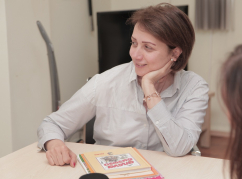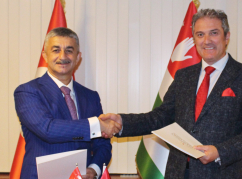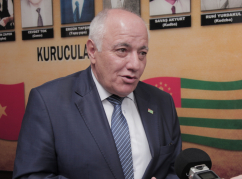Head of the Abkhazfed Atanur Akusba told about the passportization of Abkhazians in Turkey, the primary tasks of the Federation of Abkhaz Cultural Centers in Turkey and his childhood in an interview with the WAC.
Interview by Asta Ardzinba
- Atanur, you are the head of the Federation of Abkhazian Cultural Centers in Turkey (Abhazfed), tell us about what this public organization is, how many centers it includes, how many people it unites?
- For many years local Abkhazians and Abazins were part of the general Caucasian federation of cultural centers, however, even then there were separate Abkhaz centers (derneks), in particular in Istanbul and Duzce. After several states recognized Abkhazia at the international level, the Abkhaz Diaspora in Turkey decided to secede in order to become the conductor of the policy of the native country in Turkey. This happened in 2010, when the Abkhazfed was founded.
Soon after the formation of Abkhazia, we opened three more cultural centers, in addition to the centers in Istanbul and Duzce. Today, Abkhazfed already includes 14 dernecs, and we plan to open several more in those regions where our compatriots live compactly. In total, we expect that there will be no less than 20 Abkhazian derneks throughout Turkey, including in the east of the country and on the Black Sea coast.
- Are Abkhazians living in these areas?
- Yes, and these areas are still poorly studied. Some of our compatriots there visit Caucasian cultural centers, but others do not. As a result, they are separated from their native culture. We are working to bring everyone together to enable all Abkhazians and Abazins, in whatever region of Turkey they live, to be involved in the social processes of both the Diaspora and the historical homeland. It is important for us to create conditions so that they do not lose their national identity. And this is a real threat.
- What needs to be done for this?
- According to rough data, about five hundred thousand Abkhazians live in Turkey. We have data about three hundred thousand. These are the people who call themselves Abkhazians. There are also those who have Abkhazian ancestors, but they themselves have lost their national identity. They know that they have Abkhazian roots, but no longer remember their history, do not know their original names, lost their culture, forgot traditions. It is no longer possible to work with them, but we must help those who are still on the verge of assimilation.
We need help in this matter. We need materials, we need a program and a system, and we need a scientific approach. I have repeatedly stated that this issue went beyond the competence of the Abkhazfed. Now this should become one of the directions of the work of the Abkhaz authorities.
We need a state approach in this matter. The Abkhaz state has such opportunities, given its own budget, university, television. Unlike us, who are now trying to pursue this policy on a voluntary basis.
- How do the Turkish authorities relate to the activities and the fact of the existence of the Abkhazfed?
- We respect the Turkish authorities. Despite the fact that Turkey did not recognize the independence of Abkhazia, local authorities are interested in what is happening in Abkhazia, and here the Abkhazfed is the connecting link. The Turkish authorities do not create problems for us. We interact, if necessary, hold meetings with officials. The Turkish policy towards the national minorities in the country has recently changed significantly. If before our fathers and grandfathers were forced to become Turks and were not allowed to develop their own culture, now the authorities radically changed their approach.
- In addition to the opening of new Abkhaz cultural centers, what are the tasks facing the Abkhazfed today?
- When I meet with the representatives of the government of Abkhazia, I always say that Abkhazians in Turkey need to be issued Abkhaz passports. The one who hinders this, has no state thinking and acts to the detriment of his country. It is difficult to go to Abkhazia to draw up documents, far not everyone can afford this. The trip is expensive and involves a complicated procedure for obtaining a Russian visa (the nearest airport to Abkhazia is in the Russian border city of Sochi, from where it is necessary to get to the Russian-Abkhaz border on the Psou River - ed.). Therefore, it is necessary to provide an opportunity to obtain an Abkhaz passport here in Turkey.
It is necessary to pay close attention to this question now; a lot of time has already been lost. Perhaps, if we have done this much earlier, we could save from assimilation many of those who lost their national identity. If amendments to the law are needed for this, then we need to initiate them now, if we need to think over the program, we have to do it now. This is our first priority at this stage. Otherwise, it will be no longer correct talking about a half-million Diaspora in Turkey in a few years. We will lose people if we do not involve them in our social processes.
I am sure that the population of Abkhazia will support this idea, as soon as one sees with their own eyes that the Abkhazians in Turkey do not differ from the Abkhazians in Abkhazia, that we are one.
- During your visit to Abkhazia, you stated that the policy regarding the Diaspora should proceed from the preservation of the national self-consciousness of compatriots, preserve the language and culture wherever they live, that is, create conditions for the formation of the "Abkhazian world" and not only to urge us to return to live on our historical homeland. Did they listen to your words in the Abkhaz government?
- I have no feeling that they listened. Nevertheless, I will talk about this. If three million Abkhazians lived in Abkhazia, if the language was not threatened with extinction, we would all sit quietly. I would not say so much about establishing ties with the Diaspora, about the struggle for each compatriot. But the question is about the preservation of the nation. There are just a handful of us. What are we waiting for in this case and what are we afraid of?
Young Abkhazians from Turkey participated in the Patriotic War of the people of Abkhazia; many were killed for the freedom of the motherland. Maybe we should at least think about them? They rushed into the fire for Abkhazia. Do you think something Abkhazian from the ancestors has preserved within them or not?
Visit the cultural center, talk to those who come here, talk to them in Abkhazian. You suggest giving them all up, abandoning them and saying, it's not our people, we don’t need them? They are Abkhazians, no less Abkhaz than those who live in Abkhazia. They also have the right to be part of their historic homeland; they have the right to protection by the Abkhaz state.
Children need to be taken to Abkhazia, children's summer camps must be held, and they should be introduced to peers in Abkhazia. We must teach them their native language, the history of Abkhazia; tell who Ardzinba was, where Dal is located, and where Tsabal is. This should be a concern of the state.
- Atanur, I cannot help but ask you to tell me about yourself. We do not really know much about the head of Abkhazfed, we want to know more about you.
- I'm from the Akusba clan. I was born and raised near the city of Duzce, which is two hundred kilometers from Istanbul. There is an Abkhaz village of Durer near Duzce, where I come from. For more than thirty years I live in Istanbul, here I have a construction business. I am married, I have three children. I have two brothers, one of whom also lives in Istanbul. My father lives in a village near Duzce. For ten years I was deputy head of the Abkhaz Cultural Center in Istanbul, after which the members of Abkhazia elected me the head of the organization. This is a very responsible and important work, which I have been doing for six months. will hold this post for another year, after which, according to the Charter of the organization, the new head of Abkhazfed will be elected.
- You perfectly speak in Abkhazian language, is it thanks to your parents?
- In my childhood at home we spoke only in Abkhazian. It was a native language in all senses of the word. I remember well the sister of my grandfather, who was a child when the family left Abkhazia. She insisted that all family members spoke Abkhaz among themselves. The village was Abkhazian, all around were Abkhazians too. Among us lived several families of other nationalities, and even they learned our language, simply because there were very many of us. My peers, who come from Abkhazian villages, speak Abkhaz well.
I first began to learn Turkish at school. But I did not forget my native language and maintained it. In the eighties I came across the Abkhazian alphabet, and independently learned how to read. Then I began to read books that I could get, which helped me to save my language. My peers who did not do this began to forget the language. Now many of them understand Abkhazian speech, but it is already difficult for them to speak. Literature helped me a lot.
- Do you remember your first visit to Abkhazia?
- Of course I remember. Arriving, I felt that this is my home. Our grandfathers all their lives dreamed of seeing what happened to Abkhazia. They left their lives life without realizing this dream. We did it for them.



to login or register.